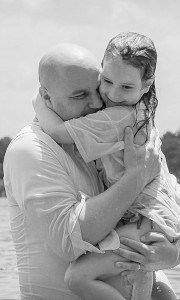A few Sundays ago, I stood knee-deep in a sparkling lake and tasted one of the sweetest moments of my life: watching my husband baptize our youngest child and only daughter, Katy Claire.
We had studied the meaning of baptism together before she entered the water — this powerful and ancient symbol of the death of our old self and and the new life we are raised to in Christ. She understood, in her own simple, six-and-a-half-year-old way, what her sin is and the terrible price Jesus had paid for it. She was ready to tell the world she had died to her life and she belonged to Him.
I’ll have to remind her as she grows, just like I have to remind myself. Every day for the Christian should be baptism Sunday — every moment one to recall the death and the resurrection that has come to us, just like Paul did for the Colossians:
…having been buried with him in baptism, in which you were also raised with him through faith in the powerful working of God, who raised him from the dead. Colossians 2:12
But this changed life — this baptism life — is hard to find sometimes. If we are to live it, dying to self and facing each day as truly alive, two things are important to know:
1. The right parts of us have to die.
We don’t get to the power of resurrection without the pain of death. Our self-improvement, climb-the-ladder, no-pain-no-gain culture knows this is true — that parts of us have to die off for us to find a better life. So we stagger around, hammer and nail in hand, looking for pieces of ourselves to crucify on our path to glory.
But we’re killing all the wrong things.
We smother the eternal richness, truth-telling and hospitality meant for our homes because we don’t have the right curtains in it — or the right people.
We strangle our true beauty or strength to feed an impossible computer-generated ideal.
We stamp out gratitude for the life in our living rooms because it doesn’t clean up after itself.
We starve the fruit hanging in the face of our own calling and ministry because it doesn’t smell like the one down the street or in the latest best-seller.
When we sacrifice the eternal for the sake of the temporary, we kill off the very things Jesus died to raise to life.
2. The right parts must be raised by the right power.
Paul says our old selves were “buried with him,” and our new lives were “raised through faith in the powerful working of God, who raised Him from the dead.” We were brought to life by the same extraordinary, time-splitting force that called Jesus forth from the grave.
If we constantly feel like we’ll never change — like we’ll never become our true selves — it’s because of one of two things:
we are trying to bring what God has pronounced dead back to life, or we are trying resuscitate something eternal with temporary power.
Our old life — with its focus on self and the glories of this world — has been crucified and buried with Christ. Trying to make that life work again is like putting a corpse on a treadmill: we’re going to put in a whole lot of work without going anywhere, and it’s going to stink.
And our new life can’t find its oxygen in physical means: family, addictions, work, pleasure, clean houses, good works, temporary callings, spa days, religious rituals, how many people like us on Facebook. We’ll feel dead inside — half-resurrected — a puppet of our fears that the hope we stand on could collapse at any moment. We’ll choke on dust of the earth when we’re gasping for the breath of the Spirit.
The baptized, spiritual, powerful life — a life of true change — is knowing and living and hoping only in this: that the old self has been buried with Him, and the new is raised only through faith in the powerful working of God.
It’s asking What in my life needs to be saved, and who am I counting on to save it?



0 Comments